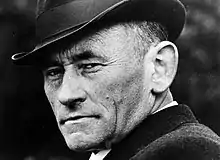Seán Ó Ríordáin
Seán Pádraig Ó Ríordáin (3 December 1916 – 21 February 1977) was an Irish language poet during the twentieth century. He brought European themes into Irish poetry.[1][2][3]
Seán Ó Ríordáin | |
|---|---|
 | |
| Native name | Seán Pádraig Ó Ríordáin |
| Born | 3 December 1916 Baile Mhúirne, County Cork, Ireland |
| Died | 21 February 1977 (aged 60) Glanmire, County Cork, Ireland |
| Occupation | poet, writer |
| Notable works | Eireaball Spideoige |
Life
He was born in Baile Mhúirne, County Cork,[4] the eldest of three children of Seán Ó Ríordáin[5] of Baile Mhúirne and Mairéad Ní Loineacháin[5] of Cúil Ealta.
English was his first language. His mother spoke English; his father spoke Irish and English. His father's mother, a native Irish speaker, lived next door. His next-door neighbour on the other side also spoke Irish. It wasn't long before Ó Ríordáin gained some knowledge of Irish.
Seán was only ten when his father died of tuberculosis. Five years later, the family moved to Inniscarra, on the outskirts of Cork city.[4] After settling there, Seán and his brother Tadhg were sent to school in the North Monastery Christian Brothers School, on Cork's northside.[4] When he was a young man he was diagnosed with tuberculosis. He lived to the age of sixty and was constantly in poor health.
Poet
Ó Ríordáin published four books: Eireaball Spideoige [A Robin's Tail] (Sáirséal Ó Marcaigh 1952, 1986), a volume of some hundred pages, and three subsequent booklets, Brosna [Kindling] (Sáirséal agus Dill 1964), Línte Liombó [Limbo Lines] (Sáirséal agus Dill 1971), and the posthumous Tar éis mo Bháis [After my Death] (Sáirséal agus Dill, 1978) .[6]
The title of his first collection is borrowed from the first line of the final verse of Ó Ríordáin's more celebrated poem. A new frisson was created in Irish language poetry when this poem, Adhlacadh Mo Mháthar (My Mother's Burial), was first published in 1945. It celebrates the innocence, devoutness, and motherliness of the poet's dead mother.
Interpretation
Ó Ríordáin delineates his personal aesthetic and theology in the preface to his first collection of poetry, Eireaball Spideoige (A Robin’s Tail) (1952), in which he highlights the relationship between artistic expression, poetry in particular, and being. He argues that poetry is to be under the aspect of another and without that relationship one can only ever produce a prosaic narrative. In that same preface, Ó Ríordáin considers an appropriation of an infant's mind as a prerequisite for the poetic act. The poem An Peaca (The Sin) reveals that Ó Ríordáin's ability to write poetry is at once lost if his immediate relation to nature is interrupted.
Ó Ríordáin has been described as a European poet. The clash between traditional Irish and contemporary European influences was one of the most consistent conflicts in his work. As with all 'modernisers' of tradition, Ó Ríordáin received considerable opprobrium from traditionalists, most notably Máire Mhac an tSaoi. These attacks, particularly by Mhac an tSaoi on the standard of his Irish, did considerable damage to Seán's confidence and added to his already ill health. He never forgave Mhac an tSaoi. In a 1970 'Writer in Profile' television interview with Ó Ríordáin, Mhac an tSaoi phoned the station to say that she 'had never heard better Irish spoken than that by Seán Ó Ríordáin tonight'. Ó Ríordáin's response, as recorded by his biographer Seán Ó Coileáin: 'my bowels moved in disdain'.[7]
As well as writing poetry, he wrote a column in The Irish Times during the latter years of his life in which he spoke vehemently about national affairs. A number of his poems have appeared in English translation, for example, Modern Irish Poetry: An Anthology (ed. Patrick Crotty).[6]
Popular Poems
Ó Ríordáin's poems have enjoyed constant popularity, due in part to the exposure gained by the inclusion of his work in the standard Irish curriculum. Poems such as Fill Arís, Cúl an Tí and Tost are widely known and Fill Arís was short-listed in the Favourite Irish Poems competitions run by RTÉ in 2015. "Toil" is a contemplation on the limitations of human will.[8]
References
- Much of the material here is drawn from a TG4 2007 documentary directed by Traolach O Buachalla."Mise Seán Ó Riordáin 1 - the man behind the great Irish poet from Cork". YouTube. 2011-11-27. Retrieved 2012-03-20.
- "Mise Seán Ó Riordáin 2 - the man behind the great Irish poet from Cork". YouTube. 2011-11-24. Retrieved 2012-03-20.
- "Mise Seán Ó Riordáin 3 - the man behind the great Irish poet from Cork". YouTube. 2011-11-27. Retrieved 2012-03-20.
- "Seán Ó Ríordáin". The Concise Oxford Companion to Irish Literature. Oxford University Press. 1996, 2000, 2003. Retrieved 22 July 2010. Check date values in:
|date=(help) - "Seán Ó Riordáin Papers". University College Dublin. Retrieved July 22, 2010.
- Boylan, Henry (1998). A Dictionary of Irish Biography, 3rd Edition. Dublin: Gill and MacMillan. p. 350. ISBN 0-7171-2945-4.
- Frank Sewell, Modern Irish Poetry: A New Alhambra (Oxford, 2000), p.48.
- Modern Ireland in 100 Artworks: 1971– Línte Liombó, by Seán Ó Ríordáin "The collection contains only one long(ish) poem, Toil, which is an extended and unresolved contemplation on the limitations of human volition and autonomy, comparable with the earlier Saoirse, but much more accepting of the human condition as incurably defective."
Bibliography
- Sewell, Frank C (2001). Modern Irish Poetry: A New Alhambra. OUP Oxford. ISBN 0191584355.